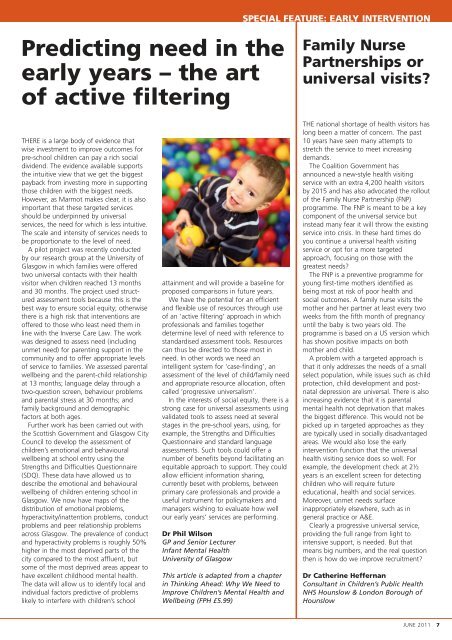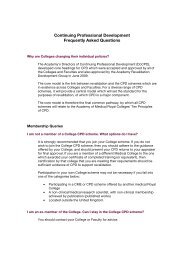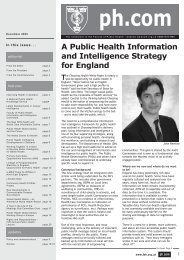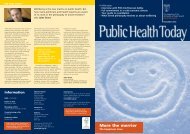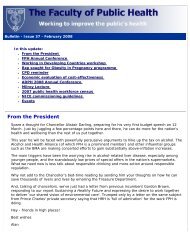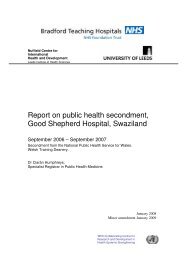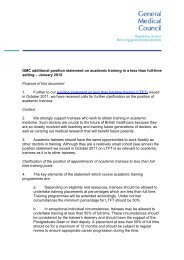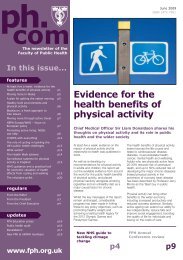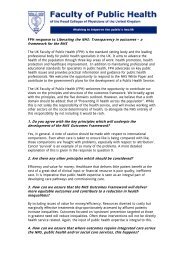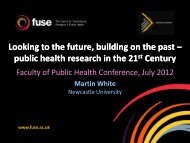PHT June 2011_Jan 10 - UK Faculty of Public Health
PHT June 2011_Jan 10 - UK Faculty of Public Health
PHT June 2011_Jan 10 - UK Faculty of Public Health
Create successful ePaper yourself
Turn your PDF publications into a flip-book with our unique Google optimized e-Paper software.
Predicting need in the<br />
early years – the art<br />
<strong>of</strong> active filtering<br />
SPECIAL FEATURE: EARLY INTERVENTION<br />
Family Nurse<br />
Partnerships or<br />
universal visits?<br />
THERE is a large body <strong>of</strong> evidence that<br />
wise investment to improve outcomes for<br />
pre-school children can pay a rich social<br />
dividend. The evidence available supports<br />
the intuitive view that we get the biggest<br />
payback from investing more in supporting<br />
those children with the biggest needs.<br />
However, as Marmot makes clear, it is also<br />
important that these targeted services<br />
should be underpinned by universal<br />
services, the need for which is less intuitive.<br />
The scale and intensity <strong>of</strong> services needs to<br />
be proportionate to the level <strong>of</strong> need.<br />
A pilot project was recently conducted<br />
by our research group at the University <strong>of</strong><br />
Glasgow in which families were <strong>of</strong>fered<br />
two universal contacts with their health<br />
visitor when children reached 13 months<br />
and 30 months. The project used structured<br />
assessment tools because this is the<br />
best way to ensure social equity; otherwise<br />
there is a high risk that interventions are<br />
<strong>of</strong>fered to those who least need them in<br />
line with the Inverse Care Law. The work<br />
was designed to assess need (including<br />
unmet need) for parenting support in the<br />
community and to <strong>of</strong>fer appropriate levels<br />
<strong>of</strong> service to families. We assessed parental<br />
wellbeing and the parent-child relationship<br />
at 13 months; language delay through a<br />
two-question screen, behaviour problems<br />
and parental stress at 30 months; and<br />
family background and demographic<br />
factors at both ages.<br />
Further work has been carried out with<br />
the Scottish Government and Glasgow City<br />
Council to develop the assessment <strong>of</strong><br />
children’s emotional and behavioural<br />
wellbeing at school entry using the<br />
Strengths and Difficulties Questionnaire<br />
(SDQ). These data have allowed us to<br />
describe the emotional and behavioural<br />
wellbeing <strong>of</strong> children entering school in<br />
Glasgow. We now have maps <strong>of</strong> the<br />
distribution <strong>of</strong> emotional problems,<br />
hyperactivity/inattention problems, conduct<br />
problems and peer relationship problems<br />
across Glasgow. The prevalence <strong>of</strong> conduct<br />
and hyperactivity problems is roughly 50%<br />
higher in the most deprived parts <strong>of</strong> the<br />
city compared to the most affluent, but<br />
some <strong>of</strong> the most deprived areas appear to<br />
have excellent childhood mental health.<br />
The data will allow us to identify local and<br />
individual factors predictive <strong>of</strong> problems<br />
likely to interfere with children’s school<br />
attainment and will provide a baseline for<br />
proposed comparisons in future years.<br />
We have the potential for an efficient<br />
and flexible use <strong>of</strong> resources through use<br />
<strong>of</strong> an ‘active filtering’ approach in which<br />
pr<strong>of</strong>essionals and families together<br />
determine level <strong>of</strong> need with reference to<br />
standardised assessment tools. Resources<br />
can thus be directed to those most in<br />
need. In other words we need an<br />
intelligent system for ‘case-finding’, an<br />
assessment <strong>of</strong> the level <strong>of</strong> child/family need<br />
and appropriate resource allocation, <strong>of</strong>ten<br />
called ‘progressive universalism’.<br />
In the interests <strong>of</strong> social equity, there is a<br />
strong case for universal assessments using<br />
validated tools to assess need at several<br />
stages in the pre-school years, using, for<br />
example, the Strengths and Difficulties<br />
Questionnaire and standard language<br />
assessments. Such tools could <strong>of</strong>fer a<br />
number <strong>of</strong> benefits beyond facilitating an<br />
equitable approach to support. They could<br />
allow efficient information sharing,<br />
currently beset with problems, between<br />
primary care pr<strong>of</strong>essionals and provide a<br />
useful instrument for policymakers and<br />
managers wishing to evaluate how well<br />
our early years’ services are performing.<br />
Dr Phil Wilson<br />
GP and Senior Lecturer<br />
Infant Mental <strong>Health</strong><br />
University <strong>of</strong> Glasgow<br />
This article is adapted from a chapter<br />
in Thinking Ahead: Why We Need to<br />
Improve Children’s Mental <strong>Health</strong> and<br />
Wellbeing (FPH £5.99)<br />
THE national shortage <strong>of</strong> health visitors has<br />
long been a matter <strong>of</strong> concern. The past<br />
<strong>10</strong> years have seen many attempts to<br />
stretch the service to meet increasing<br />
demands.<br />
The Coalition Government has<br />
announced a new-style health visiting<br />
service with an extra 4,200 health visitors<br />
by 2015 and has also advocated the rollout<br />
<strong>of</strong> the Family Nurse Partnership (FNP)<br />
programme. The FNP is meant to be a key<br />
component <strong>of</strong> the universal service but<br />
instead many fear it will throw the existing<br />
service into crisis. In these hard times do<br />
you continue a universal health visiting<br />
service or opt for a more targeted<br />
approach, focusing on those with the<br />
greatest needs?<br />
The FNP is a preventive programme for<br />
young first-time mothers identified as<br />
being most at risk <strong>of</strong> poor health and<br />
social outcomes. A family nurse visits the<br />
mother and her partner at least every two<br />
weeks from the fifth month <strong>of</strong> pregnancy<br />
until the baby is two years old. The<br />
programme is based on a US version which<br />
has shown positive impacts on both<br />
mother and child.<br />
A problem with a targeted approach is<br />
that it only addresses the needs <strong>of</strong> a small<br />
select population, while issues such as child<br />
protection, child development and postnatal<br />
depression are universal. There is also<br />
increasing evidence that it is parental<br />
mental health not deprivation that makes<br />
the biggest difference. This would not be<br />
picked up in targeted approaches as they<br />
are typically used in socially disadvantaged<br />
areas. We would also lose the early<br />
intervention function that the universal<br />
health visiting service does so well. For<br />
example, the development check at 2½<br />
years is an excellent screen for detecting<br />
children who will require future<br />
educational, health and social services.<br />
Moreover, unmet needs surface<br />
inappropriately elsewhere, such as in<br />
general practice or A&E.<br />
Clearly a progressive universal service,<br />
providing the full range from light to<br />
intensive support, is needed. But that<br />
means big numbers, and the real question<br />
then is how do we improve recruitment?<br />
Dr Catherine Heffernan<br />
Consultant in Children’s <strong>Public</strong> <strong>Health</strong><br />
NHS Hounslow & London Borough <strong>of</strong><br />
Hounslow<br />
JUNE <strong>2011</strong> 7


